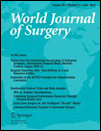Factors Affecting Success Rate of Advanced Trauma Life Support (ATLS) Courses
This study was presented at the Royal Australasian College of Surgeons 81st Annual Scientific Congress, Kuala Lumpur, Malaysia, 6–10 May 2012, and is published in abstract form in ANZ J Surg 2012; 82 (Suppl. 1):164.
Abstract
Background
The aim of the present study was to define the factors that affect passing the assessments for successful completion of the Advanced Trauma Life Support (ATLS) Provider Courses in the United Arab Emirates (UAE).
Methods
The ATLS Provider Course has been taught in three medical centers in the UAE since 2004. A total of 1,041 doctors completed the course during the period 2004–2010. A special protocol was designed to enter data accrued for each course, participants’ demographics, and assessments, including the final results. Direct logistic regression was performed to define factors affecting success in multiple choice questions (MCQ) and in the practical initial assessment station exam. The studied variables included the year, the course site, speciality, level of practice, and pre-test score.
Results
The majority of participants were surgeons (33.2 %), followed by Emergency Medicine physicians (27.3 %). The logistic regression model showed that having a low pre-test score (p < 0.0001) and being a family medicine practitioner (p < 0.0001) increased the likelihood of failing the MCQ exam. The chance of passing the end of course practical exam increased with time (p = 0.002). A low pre-test score (p < 0.0001) and being examined in site A (p = 0.04) increased the chance of failing in the initial assessment exam. The pass rate for the ATLS exam significantly increased after adoption of the interactive approach to teaching.
Conclusions
Prior knowledge and preparation is essential to passing the ATLS exam. Doctors who deal clinically with all aspects of airway, breathing, and circulation of the ATLS course are more likely to pass the MCQ exam in our setting, followed by those who usually manage only the circulation or disability aspects of ATLS. It is possible that the interactive approach to teaching ATLS has improved the overall ATLS success rate.




